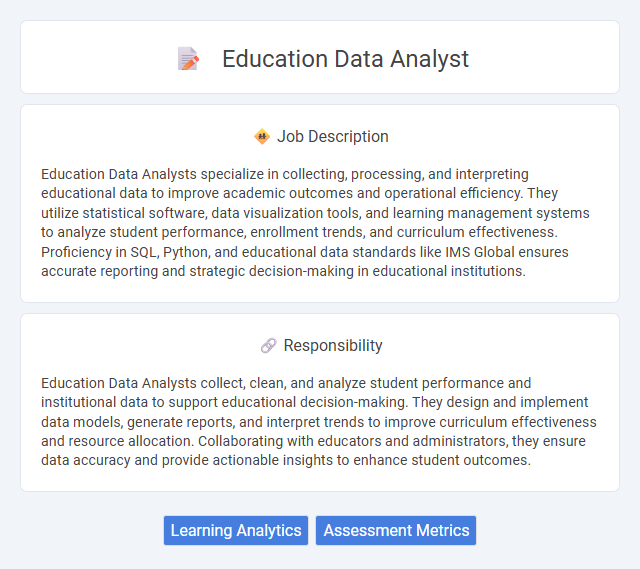
Education Data Analysts specialize in collecting, processing, and interpreting educational data to improve academic outcomes and operational efficiency. They utilize statistical software, data visualization tools, and learning management systems to analyze student performance, enrollment trends, and curriculum effectiveness. Proficiency in SQL, Python, and educational data standards like IMS Global ensures accurate reporting and strategic decision-making in educational institutions.
Individuals with strong analytical skills and a passion for education data are likely to thrive as Education Data Analysts. Those comfortable working with large datasets, interpreting trends, and providing actionable insights may find this role particularly suitable. Candidates lacking attention to detail or an interest in educational systems could face challenges in meeting the job's demands.
Qualification
Education Data Analysts require a strong background in statistics, data science, or education-related fields, typically holding a bachelor's or master's degree in these areas. Proficiency in data analysis tools such as SQL, Python, R, and educational software platforms is essential for interpreting complex datasets and generating actionable insights. Experience with data visualization tools like Tableau or Power BI enhances the ability to communicate findings effectively to educators and administrators.
Responsibility
Education Data Analysts collect, clean, and analyze student performance and institutional data to support educational decision-making. They design and implement data models, generate reports, and interpret trends to improve curriculum effectiveness and resource allocation. Collaborating with educators and administrators, they ensure data accuracy and provide actionable insights to enhance student outcomes.
Benefit
Education Data Analysts likely offer significant benefits by improving decision-making through data-driven insights, which can enhance student outcomes and institutional efficiency. Their work probably enables schools to identify trends, allocate resources effectively, and tailor educational programs to diverse learner needs. Investing in Education Data Analysts may result in better policy shaping and measurable improvements in educational quality.
Challenge
Education Data Analyst roles likely present challenges in managing large, complex datasets from diverse educational sources, which can complicate data integration and accuracy. Interpreting and translating data insights into actionable recommendations may require advanced statistical skills and a deep understanding of educational policies. Navigating privacy regulations and ensuring compliance while maintaining data usability probably remains a persistent concern.
Career Advancement
Education Data Analysts leverage statistical tools and educational metrics to improve institutional outcomes and inform policy decisions. Mastery of advanced data analysis software and pedagogical research techniques significantly enhances prospects for promotion to senior analyst or educational data scientist roles. Continuous skill development in machine learning and data visualization drives career growth within educational organizations and consulting firms.
Key Terms
Learning Analytics
Education Data Analysts specializing in Learning Analytics leverage data from educational platforms to improve student outcomes and instructional strategies. They analyze metrics such as student engagement, assessment results, and learning behaviors to identify trends and optimize curriculum design. Expertise in statistical tools, data visualization, and educational software is critical for transforming raw data into actionable insights that drive evidence-based decisions in academic settings.
Assessment Metrics
Education Data Analysts specialize in evaluating assessment metrics to measure student performance, identify learning gaps, and improve instructional strategies. They analyze standardized test scores, formative assessments, and comparative data sets to generate actionable insights for educators and policymakers. Proficiency in statistical tools and educational data systems is essential to develop reliable evaluation frameworks supporting student achievement.
 kuljobs.com
kuljobs.com